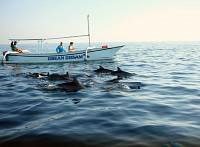
PAPUA ISLAND OR IRIAN JAYA
Papua comprises most of the western half of the island of New Guinea and nearby islands. Its capital is Jayapura. It's the largest and easternmost province of Indonesia. The province originally covered the entire western half of New Guinea. In 2003, the Indonesian government declared the westernmost part of the island, around Bird's Head Peninsula, a separate province; its name was first West Irian Jaya and is now West Papua.
"Papua" is the official Indonesian and internationally recognized name for the province.
During the Dutch colonial era the region was known as part of "Dutch New Guinea" or "Netherlands New Guinea". Since its annexation in 1969, it became known as "West Irian" or "Irian Barat" until 1973, and thereafter renamed "Irian Jaya" (roughly translated, "Glorious Irian") by the Suharto administration. This was the official name until the name "Papua" was adopted in 2002. Today, natives of this province prefer to call themselves Papuans.
The name "West Papua" was adopted in 1961 by the New Guinea Council until the United Nations Temporary Executive Authority (UNTEA) transferred administration to the Republic of Indonesia in 1963. "West Papua" has since been used by Papuans as a self-identifying term, especially by those demanding self-determination, and usually refers to the whole of the Indonesian portion of New Guinea. The other Indonesian province that shares New Guinea, West Irian Jaya, has been officially renamed as "West Papua".
Within Indonesia and West Papua itself, 'Papua' usually refers to the entire western half of New Guinea despite its division into separate provinces. Western New Guinea is generally referred to as 'West Papua' internationally especially among networks of international solidarity with the West Papuan independence movement.
 PAPUA PACKAGE TOURS |
 TANA TORAJA TOURS |
GOVERNMENT
The province of Papua is governed by a directly elected governor (currently Barnabas Suebu) and a regional legislature, DPRP (Dewan Perwakilan Rakyat Papua). A government organization that only exists in Papua is the MRP (Majelis Rakyat Papua / Papuan People's Council), which was formed by the Indonesian Government in 2005 as a coalition of Papuan tribal chiefs, tasked with arbitration and speaking on behalf of Papuan tribal customs.
Best Recommended Adventures |
||||
 Canyoning Trekking |
 Mount Bromo |
|||
 ATV Ride Tour |
 Jogjakarta |
 Dive Course |
||
 Ijen Crater |
||||





















